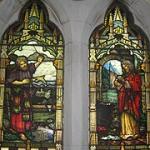
“In all thy ways acknowledge [God] and he shall direct thy paths” (Proverbs 3:5-5). As with most Proverbs, we receive brief, specific, clear, powerful counsel. But our path will be our own, as our decisions must be our choices.
Our Savior knows where we are, where we should be, and where we might eventually advance to be. And He guides and guards our way in His perfect vision and knowledge.
Recognizing and Committing
My BYU students often ask why their prayers for direction are not answered. At least they think their prayers are not answered. They want a clear “yes” or “no,” not realizing that “explore” is also an answer—essential in navigating our path of life.
Late Apostle Richard G. Scott explained that this opportunity is “not for lack of concern, but because He loves us—perfectly.” Elder Scott continued,
He wants us to apply truths He has given us. For us to grow, we need to trust our ability to make correct decisions. We need to do what we feel is right. In time, He will answer. He will not fail us.
To help us find the path God intends for us, the Lord has given scriptures that teach what the territory is like and how we must prepare to find our way through it. They include instructions and warnings—the principles and commandments that will help us find our way and protect us as we move along. They show distractions and carelessness. Exploration is a blessing and opportunity for gaining knowledge and experience. When the Savior needs to intervene, He will.
Choosing and Staying on the Path
Elder Dale G. Renlund contributed this perspective: God does not force us onto any path. “He gives us the dignity of choosing.” He will not violate our agency to get on or off. “No one can, without our cooperation, take us off the path.”
The scriptures provide path-changing examples. Alma the elder needed to remove himself quickly from King Noah’s power. Abinadi had revealed the path, and God touched Alma’s heart and mind to recognize the truth and follow it. Alma wrote all Abinadi’s words. On God’s path, opportunities opened to follow it: other truth-path-seekers and a gathering place with fresh water and tree cover. Important paths affecting all Nephite history and culture opened. Immediate guidance was necessary, and Alma received it (see Mosiah 17).
Alma’s son, “Alma the Younger,” needed to leave immediately his path as “a very wicked and idolatrous man,” who flattered people “to do after the manner of his iniquities.” He attempted “to destroy the church, and to lead astray the people of the Lord.”
The younger Alma needed something fast and dramatic, and he got it. An angel with a voice of thunder, physical helplessness, and three days experiencing where his path led. He could have rejected the summons to a new path. Several Book of Mormon anti-Christs did; their paths were short and tragic. Young Alma changed his path abruptly and never looked back (see Mosiah 27).
The parable of the talents tells of three who were left temporarily to explore. The talents (opportunities) were given “to every man according to his several ability.” The path for using five talents effectively was probably complex and difficult. But the servant got right on the path and gained five more talents. The paths for a two-talent user would probably have been less complicated and threatening. This servant also accepted the path given him and traveled it well, earning two more talents. The man with one talent rejected the path totally (see Matthew 25); he used his agency and closed off his path.
Stepping off the path is easy. Elder Renlund acknowledged, “All members slip off the path—some of us even dive off.” Some choose to remain off. But Elder Renlund assured that the Savior wants us to return. And “the moment we decide to change, God helps us return. From God’s perspective, through sincere repentance and pressing forward with a steadfastness in Christ, once back on the path, it will be as if we were never off.”
Remaining on Challenging Paths
God knows our efforts, and He does not leave us alone. As President Nelson helped us understand, following His path “does not mean that life will be easy.” He specified,
This path is rigorous and at times will feel like a steep climb. This ascent, however, is designed to test and teach us, refine our natures, and help us to become saints. It is the only path that leads to exaltation.
The Prophet emphasized the importance of keeping momentum moving forward. He urged us on with deep and visible faith: “Day after day, on your path toward your eternal destiny, increase your faith. Proclaim your faith! Let your faith show.”
For my students, I compare God’s guidance on any path or roadway to traffic signals.
- Sometimes we feel warm and comfortable about a decision, “a confirming assurance of the Spirit.” Like a green light, this signals us to go ahead. Like Alma the elder, this confirmation keeps us going.
- Sometimes we feel a “stupor of thought,” like a red light restraining us. Young Alma’s intense stupor rendered him helpless through three days. Lights change, and his definitely changed. He was redirected onto the right path, becoming one of the strongest and most influential prophets in the Book of Mormon.
- Yellow lights give us opportunities to explore with our mind and heart. This seems evidence of God’s trust. Considering our past decisions, He provides more practice. Physical yellow lights require faster decisions than financial talents, but if I do not see a car coming toward me, God will help me according to experience He knows that I need.
With His grace, the Lord directs our path. In this divine help, God draws us in personally as we move toward the ultimate goal of becoming more like Him.













